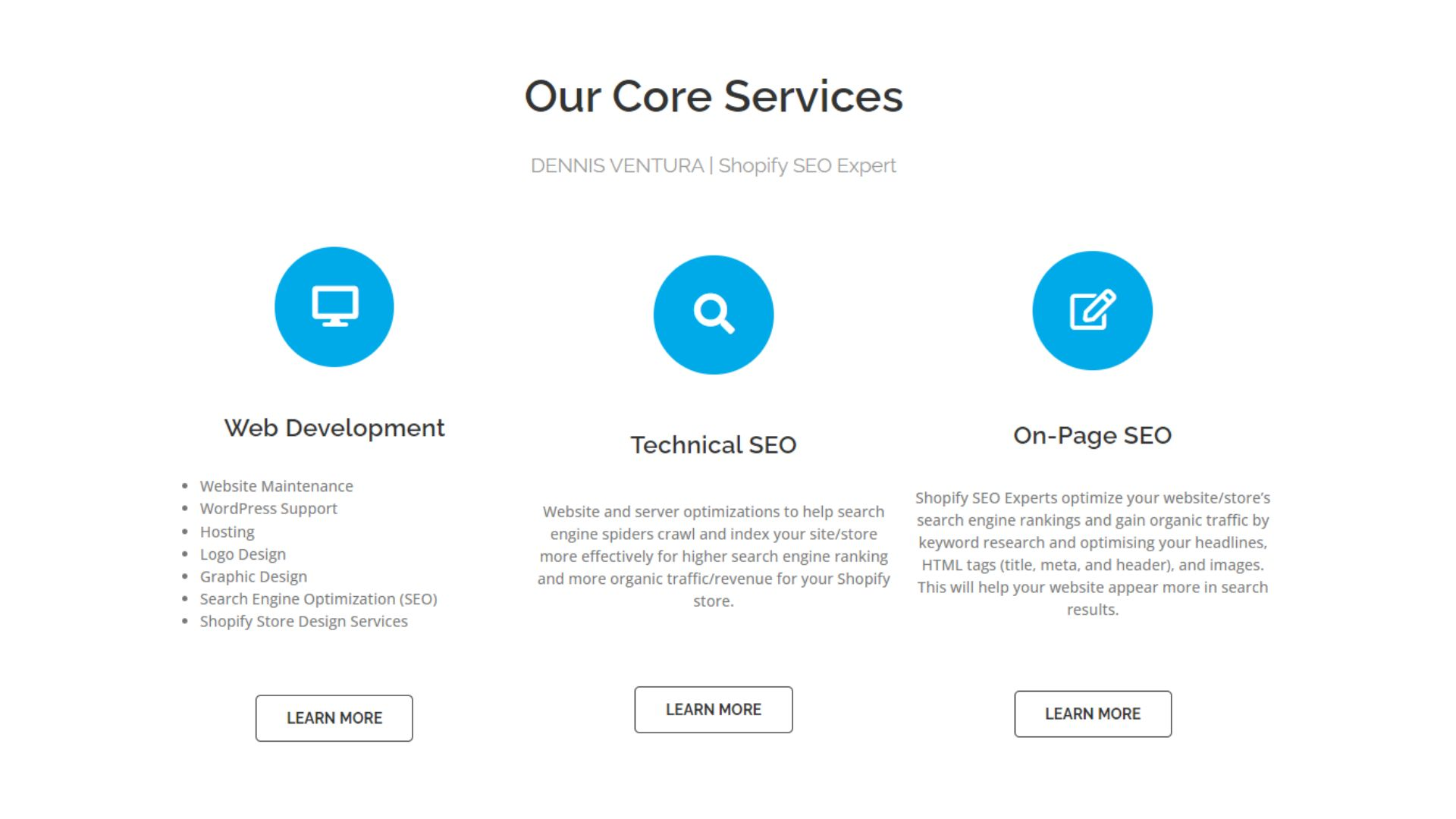
The Role of Metadata in Shopify SEO
Photo from Dennis Ventura
Originally Posted On: https://dennisventura.com/the-role-of-metadata-in-shopify-seo/
Metadata is a critical component of Shopify SEO. Metadata helps search engines understand the content on your website and index it accordingly so potential customers can easily find you. By optimizing your Metadata, you can ensure that more people can find your business online store like Shopify store and eCommerce store/eCommerce site.
Metadata includes information such as page titles, meta tags, and descriptions. It is essential to have relevant keywords in your Metadata so that search engine optimization can better understand the content on each page of your website. This way, when someone searches for a keyword related to your business specially if they use keyword research tool, they can find you more search results easily through search engine results page on Google search console and Google image search engine land.
Your meta titles should be concise and descriptive and include relevant keywords, target keywords, internal links, page title, page url, alt tags, and more. Meta tags and descriptions should also be keyword-rich, as they provide an additional opportunity to show search engine listing preview and other search engines what your content is about.
Content marketing strategy needs technical SEO, image SEO, smart SEO, On page SEO, Shopify store’s SEO strategy, SEO checklist, Yoast SEO, and other ranking factor on Google analytics.
By optimizing your Metadata, you can ensure that your website is listed higher on search engine results pages (SERPs) when someone searches for related keywords. It will help you attract more visitors to your business and increase sales.
Table of Contents
- What is Metadata, and How Does it Impact Shopify SEO?
- Optimizing Your Shopify Metadata for Better Search Engine Rankings
- The Impact of Title Tags on Shopify SEO
- How to Write Effective Meta Descriptions for Shopify SEO?
- What is the Role of Header Tags in Shopify SEO, and How to Use Them?
- Shopify SEO and the Importance of Image Metadata
- Using Schema Markup to Enhance Your Shopify Metadata for SEO
- Common Metadata Mistakes to Avoid on Your Shopify Website
- Measuring the Success of Your Shopify Metadata Strategy for SEO
What is Metadata, and How Does it Impact Shopify SEO?
Metadata is a crucial component of SEO Shopify and can improve your chances of being found online. Optimizing the Metadata on each website page with relevant keywords will help search engines better understand your content and index it accordingly. This way, people searching for topics related to your business will be able to find you more easily. Optimizing your Metadata can be a great way to attract more customers and increase sales.
Ensuring your meta titles, tags, and descriptions are keyword-rich is essential for improving the visibility of your website on SERPs. Optimizing your Metadata correctly will make it easier for potential customers to find you online.
By including relevant keywords in your Metadata, you can make sure that more people can find your business when they search for related topics. It will help you attract more visitors to your website and increase sales. Metadata is an essential element of Shopify SEO, so take the time to optimize it and maximize its impact correctly.
Optimizing Your Shopify Metadata for Better Search Engine Rankings
Optimizing your Metadata is essential to improving your Shopify SEO and boosting visibility on search engine results pages (SERPs) and search engine rankings. Metadata contains vital information such as page titles, meta tags, and descriptions; by ensuring that these are keyword-rich and descriptive, you can ensure that more people can find your website when they search for topics related to your business.
To ensure your Metadata is keyword-rich, research relevant keywords and include them in your page titles, meta tags, and descriptions. It will allow search engines better understand the content on each page of your website and index it accordingly. Optimizing your Metadata with keywords properly can be a great way to increase your visibility and attract more customers.
The Impact of Title Tags on Shopify SEO
Title tags are an essential element of Shopify SEO and can significantly impact your search engine rankings. Your title tags should be concise yet descriptive and have relevant keywords to help search engines better understand the content on each page of your website. Including keyword-rich titles in your, Metadata will ensure that more people can find your business when they search for related topics.
Your title tags also provide another excellent opportunity to attract potential customers; by including keywords that people are searching for, you can draw more attention to your website and increase the number of visitors. Optimizing your title tags with relevant keywords is essential for improving visibility and attracting more customers to your website.
How to Write Effective Meta Descriptions for Shopify SEO?
Meta descriptions are another crucial element of SEO for Shopify that can profoundly affect your search engine rankings. A good meta description should be concise and keyword-rich; it should provide enough information to draw potential customers in but not too much that they won’t click through.
It is also crucial to ensure that your meta description is relevant to the content on each page of your website; if it isn’t, visitors may need clarification about what the page is about and won’t click through. By optimizing your meta descriptions with relevant keywords correctly, you can ensure that more people can find your business when they search for related topics.
Optimizing your Metadata is essential to improving your Shopify SEO and boosting visibility on SERPs. Researching relevant keywords and including them in your page titles, tags, and descriptions will make it more comfortable for potential customers to find you online.
What is the Role of Header Tags in Shopify SEO, and How to Use Them?
Header tags are an essential element of Shopify SEO tools, as they help search engines better understand the structure of each page on your website. When properly optimized with keywords, they can also draw more attention to some webpage aspects and make it more manageable for potential customers to see what they want.
Using appropriate header tags throughout your website will help search engines interpret the content more easily and index it accordingly. Header tags should also be keyword-rich; by including relevant keywords in your header tags, you can ensure that visitors to your page can find what they’re looking for more quickly. Optimizing your header tags with keywords correctly is essential for improving your Shopify SEO and boosting visibility on SERPs.
Shopify SEO and the Importance of Image Metadata
When it comes to Shopify SEO, image metadata is often overlooked but equally as important. By including relevant keywords in the titles, descriptions, and alt text of images on your website, you can ensure that they rank higher in search engine results. It will make it easier for potential customers to find your business when searching for related topics.
An image’s alt text is crucial for SEO, as this acts as the description that search engines use to index images. Optimizing your image metadata with relevant keywords correctly ensures that your pictures appear higher in SERPs and draw more attention to your website.
A Shopify SEO expert can help you optimize your website for search engine results so that potential customers are more likely to find your business when they’re searching online. By taking the time to research keywords properly and include them in titles, tags, descriptions, and image metadata, you can ensure that your website is well-optimized and able to draw more attention from potential customers.
Using Schema Markup to Enhance Your Shopify Metadata for SEO
Schema markup is a powerful tool for optimizing your Shopify metadata for SEO and improving your website’s visibility in search engine results pages. By adding structured data to the HTML of each page, you can provide more information about the content that is available on your site. It helps search engines better understand the content within each page and index it accordingly.
When appropriately used, schema markup can have a significant impact on your website’s SEO performance; it can be used to provide more details about specific products or services, as well as enhance existing page titles, descriptions, and image metadata so that they are better optimized for search engine results. Avoid broken links in blog post search queries and search terms.
Schema markup is an essential Bing webmaster tools for optimizing Shopify metadata for SEO and boosting visibility on SERPs. There are also free tools, Shopify stores, and Shopify apps. With the help of a Shopify SEO expert, you can ensure that your website is fully optimized and draws more attention from potential customers.
Common Metadata Mistakes to Avoid on Your Shopify Website
When optimizing your Metadata for Shopify website, it is essential to avoid some critical mistakes. Focusing on target keyword stuffing, duplicate content, generic titles and descriptions, and non-informative meta tags can harm your website’s performance in search engine results.
By taking the time to research keywords properly, include them in titles and descriptions, optimize images with Metadata, and add structured data to the HTML of each page with schema markup, you can ensure that your website is well-optimized for Shopify SEO. It will make it easier for potential customers to find your business when they’re searching online.
Measuring the Success of Your Shopify Metadata Strategy for SEO
Once you’ve implemented a Shopify metadata strategy for SEO, it is essential to measure the success of your efforts to determine whether or not it is working. One way to do this is by tracking your website’s performance in organic traffic and organic search engine results pages (SERPs). DennisVentura.com is an excellent resource for monitoring SEO performance. It can be used to measure the success of your Shopify metadata strategy. Visit the website to learn more about how it can help you measure the success of your SEO efforts.





